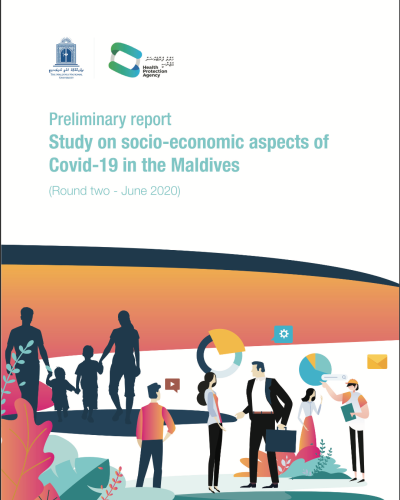Preliminary Report: Study on Socio-Economic aspects of COVID-19 in the Maldives (Round Two)

Novel coronavirus or Covid-19 pandemic continues to spread across the world. As of 15 September 2020, 215 countries and territories were affected with 29,768,800 confirmed cases, 940,016 deaths and 21, 567,042 has recovered. Maldives reported its first case on 7th March 2020 and as of 15 September 2020 reported 9328 confirmed cases and 7729 recoveries and 33 deaths. The country reported its first community case on the 15th April 2020 which triggered lockdown of greater Male’ area with travel restrictions between islands. Businesses, government offices, schools were closed and other movement of the people was restricted. The lockdown lasted about 45 days before any ease of movement was given.
While the pandemic is primarily a health issue, the measures to contain Covid-19 have wide social and economic implications. There are reports of economic 9 The Maldives National University impact this pandemic has created globally and a number of countries has taken measures to manage this economic impact. Emerging literature on the social impacts of the Covid-19 have noted the huge psycho-social impact of this pandemic. Studies conducted locally has focused largely on economic impact of Covid-19 including those specific to critical sectors such as tourism. Maldives has announced a number of interventions to cushion the vulnerabilities that are emerging out of this Covid-19 pandemic. Considering the society wide impacts expected from the pandemic, this study was registered at the National Health Research Council (NHRC/2020/006) and the Maldives National University (RR/2020/S-02) that included periodic online surveys and interviews with key informants to assess the socio-economic effects of the containment measures.
This report presents the preliminary results of the second round of online survey launched on the 12th of June 2020 to obtain information of the socio-economic challenges the people experienced since the lockdown on 15th April and their views on easing the restrictions. The objective of the survey was to understand the extent of behaviours related to Covid-19 and its prevention, perceptions about easing the restrictions imposed to contain Covid-19, quality of life, access to services and social protection and the effect of Covid-19 on work and income during lockdown.

















